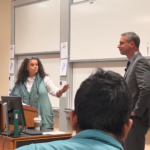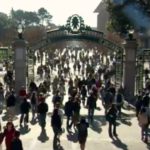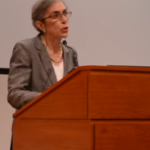Not all the news that’s fit to print: College newspapers’ Palestinian bias
Editor’s Note: This post was originally published at the Times of Israel.

When Elmer Davis, director of FDR’s Office of War Information, observed that “…you cannot do much with people who are convinced that they are the sole authorized custodians of Truth and that whoever differs from them is ipso facto wrong,” he may well have been speaking about those well-meaning, but misguided college students who rail against a world in which their dreams of social justice for the oppressed and weak are not being realized, despite their best efforts. That same tendentious behavior now seems to have been exploited by editors of college newspapers who have purposely violated the central purpose of journalism and have allowed one ideology, not facts and alternate opinions, to hijack the editorial composition of their publications.
Even more disturbing is that this errant journalistic behavior is not the result of naiveté or unprofessionalism, but is a conscious decision on the part of some editorial boards to purge their respective newspapers of any content — news or opinion — that contradicts a pro-Palestinian narrative and would provide a defense of Israel.
The latest example is a controversy involving The McGill Daily and its recent astonishing admission that it is the paper’s policy to not publish “pieces which promote a Zionist worldview, or any other ideology which we consider oppressive.”
“While we recognize that, for some, Zionism represents an important freedom project,” the editors wrote in a defense of their odious policy, “we also recognize that it functions as a settler-colonial ideology that perpetuates the displacement and the oppression of the Palestinian people.” After the paper had given its tacit support to a 2015 Boycott, Divestment, and Sanctions (BDS) resolution, and had then run a satirical piece this September, “White Tears Increase on Campus,” which seemed to mock Jewish students complaining about the anti-Israel campus climate and asserted that they were in fact privileged by virtue of being “white,” a McGill student, Molly Harris, filed a complaint with the Students’ Society of McGill University’s (SSMU) equity committee. In that complaint, Harris contended that, based on the paper’s obvious anti-Israel bias, and “a set of virulently anti-Semitic tweets from a McGill Daily writer,” a “culture of anti-Semitism” defined the Daily — a belief seemingly confirmed by the fact that several of the paper’s editors themselves are BDS supporters and none of the staffers are Jewish.
In fact, on the basis of both the EUMC and US State Department’s working definitions of anti-Semitism, the editors’ spurious contention that Zionism “functions as a settler-colonial ideology that perpetuates the displacement and the oppression of the Palestinian people” is, in itself, anti-Semitic, since, according to the EUMC, it denies “the Jewish people their right to self-determination, e.g., by claiming that the existence of a State of Israel is a racist endeavor.”
In answering Harris’s charges in their November 7th commentary, the editors mistakenly claimed that the accusations “rested on the conflation of anti-Zionism and anti-Semitism, which we understand to be distinct from one another.” Though criticism of Israel and Zionism does not always constitute anti-Semitism, they frequently overlap, as they have in the case of the Daily, where the editors’ characterization of Israel as a settler-colonial enterprise complicit in the ongoing oppression of the perennially victimized Palestinians is a classic anti-Jewish libel.
Of course, in addition to the existence of an insidious anti-Semitism permeating the editorial environment of The Daily, there is also the core issue of what responsibility a newspaper has to not insert personal biases and ideology into its stories, and to provide space for alternate views on many issues — including the Israeli/Palestinian conflict — in the opinion sections of the paper.
At Connecticut College, Professor Andrew Pessin also found himself vilified on campus, not only by a cadre of ethnic hustlers and activists, but by fellow faculty and an administration that were slow to defend Pessin’s right to express himself — even when, as in this case, his ideas were certainly within the realm of reasonable conversation about a difficult topic: the conflict between Israel and Hamas. Central to the campaign of libels waged against Pessin was the part played by the College’s student newspaper, The College Voice.
In August of 2014, during Israel’s incursions into Gaza to suppress deadly rocket fire aimed at Jewish citizens, Pessin, a teacher of religion and philosophy, wrote on his Facebook page a description of how he perceived Hamas, the ruling political entity in Gaza: “One image which essentializes the current situation in Gaza might be this. You’ve got a rabid pit bull chained in a cage, regularly making mass efforts to escape.”
That image of a pit bull did not sit well with at least one Connecticut College student, Lamiya Khandaker, who, not coincidentally, had founded a chapter of Students for Justice in Palestine, the virulently anti-Israel, sometimes anti-Semitic student activist group operating on more than 115 campuses across America.
Khandaker complained publicly about Pessin’s old Facebook post, asserting that it was dehumanizing and racist, and claiming that Pessin was characterizing all Palestinians, not just Hamas, as pit bulls. Though it was clear from his previous posts and the context of the post in question that Pessin was referencing only Hamas, a US State Department-designated terrorist organization, as a rabid dog, he deleted the offending Facebook entry, and even proffered an apology.
Pessin’s apology was insufficient for the ever-suffering moral narcissists on his campus. In fact, editors of The College Voice insisted that Pessin’s thoughts were “dehumanizing” to Palestinians and had “caused widespread alarm in the campus community.” The paper’s editor, Ayla Zuraw-Friedland, initiated a campaign of lies against Dr. Pessin, contending that his post “caused widespread alarm in the campus community,” that the college community could and should “identify racism when we see it,” and that the very students viciously attacking Pessin for his thoughts were themselves “victims of racism.” In March 2015, the College Voice even ran three op-eds, beginning on the paper’s front page, that condemned Pessin and accused him of racism and comparing Palestinians to rabid dogs.
Not content with using the newspaper as an instrument with which to conduct a campaign of demonization against Pessin, Zuraw-Friedland also purportedly created an anti-Pessin petition that was circulated widely throughout the campus.
The Wesleyan University community also underwent collective apoplexy over a 2015 opinion submission in the school’s student newspaper, The Argus, which critically examined the Black Lives Matter movement. The thoughtful, relatively-benign op-ed, written by sophomore Bryan Stascavage, a 30-year-old Iraq veteran and self-described “moderate conservative,” questioned if the behavior of some BLM supporters “cheering after [a police] officer is killed, chanting that they want more pigs to fry like bacon” showed a moral and ideological flaw in the movement, leading him to wonder, “is the movement itself actually achieving anything positive? Does it have the potential for positive change?”
That opinion was apparently more than many of the sensitive fellow Wesleyan students could bear, and the newspaper’s staff was inundated with denunciations of the implicit racism of the offending op-ed and the “white privilege” demonstrated by its author, demands that apologies be issued by the paper’s editors, the widespread theft of The Argus around campus, calls for sensitivity/social justice training for staffers, and even a vote to halve the Argus’s annual funding to instead subsidize alternate publications, presumably for marginalized students.
The shell-shocked editors even published a front-page apology for having run the piece in the first place, cravenly caving to the sensibilities of the campus crybabies and saying they understood “the frustration, anger, pain, and fear that members of the student body felt in response to the op-ed ‘Why Black Lives Matter Isn’t What You Think.’” More tellingly, they wrote, “in light of the Black Lives Matter op-ed, students of color may not feel comfortable [emphasis added] or welcome writing for The Argus.
College students have now taken a new, misguided approach in their attempt to suppress speech whose content they do not approve of, as they seem to have done at Wesleyan. On college campuses, to paraphrase George Orwell, all views are equal, but some are more equal than others.
To illustrate how a double standard exists in the academy as it relates to academic free speech one only has to look at other opinion pieces that have appeared in the self-same Argus, such as a March 2015 column written by members of Students for Justice in Palestine (SJP), a corrosive, anti-Israel group, who published an op-ed with the mendacious title, “Israel’s Apartheid State.”
In the op-ed, written as the annual anti-Israel hate fest known as Israeli Apartheid Week was about to get underway at Wesleyan and campuses around the country, Israelis, and those Jewish students and other pro-Israel individuals on campus who support Israel, are described by the writers as racists, oppressors, ethnic cleansers, thieves and appropriators of Palestinian land, participants in “state terror,” colonial settlers, and aggressive militants who randomly and barbarically initiate “wars against Gaza” while slaughtering innocent Arabs in violation of international law, seemingly without motivation or justification.
While the Argus editors, in their extensive apology for the BLM op-ed, claimed that the writer had “twisted the truth” and misrepresented facts in making his argument, and that they felt editorial responsibility for not fact-checking the piece, in fact the op-ed did not wildly distort facts or misrepresent the recent history of the Black Lives Matter movement, at all. Readers who denounced the piece did not like the motives of a victim group being critiqued and deconstructed by someone who questioned the morality of the movement itself, particularly a white writer. But one could just as easily, and perhaps more relevantly, ask why the editors had not employed that same editorial scrutiny when they agreed to publish the libelous piece by the SJP members in March, an opinion piece whose main message was built upon an analysis that was fraught with untruths, distortions of history and fact, libelous assertions about political behavior and military operations, and a view of the Israeli/Palestinian conflict that disingenuously assigns all of the blame on Israel and ignores Arab rejectionism and truculence, not to mention terrorism, in the decades-long assault on the Jewish state.
Specifically, there is no institutionalized apartheid in Israel, as any sentient observer knows, yet both the title and the main thrust of the piece repeatedly assert that Israel is practicing apartheid against the hapless Palestinians, and that, in the writers’ view, “apartheid is a useful and accurate term to describe the myriad mechanisms of oppression and separation employed by the Israeli state.”
Another equally disingenuous SJP October 2015 op-ed in The Argus, “Occupation Breeds Violence, Free Palestine,” written as Palestinian murderers were stabbing, shooting, and driving over Israeli citizens in a month-long wave of terror, remarkably assigned the blame for the carnage, not on the psychopaths who were perpetrating it, but on its victims, asserting that “SJP not only condemns terror, we go further by condemning the primary engine of the ‘recent surge in violence’: Israel’s illegal military occupation of the West Bank.” More ridiculously, they claimed, not the terrorists who slaughter civilians but the so-called occupation is the cause of the current violence, and “’the occupation is the ultimate terrorist infrastructure,’” establishing a false moral equivalence between terrorists and Israeli forces trying to protect its citizenry from being killed.
The late Senator Daniel Patrick Moynihan once quipped that “everyone is entitled to his opinion, but not to his own facts,” and the lesson here is that if the Argus editors are serious about excluding opinion pieces that “twist the facts” or distort truth in an effort to make a point, then these pieces by the SJP members would fail that editorial test as surely as the Stascavage op-ed was accused of doing when discussing Black Lives Matter. The SJP pieces were replete with distortions, libels, untruths, and a misreading of history and politics, yet no Jewish students came forward to denounce the editors for having published such an egregiously biased, erroneous piece, no Israel supporters called for defunding the paper for running blatantly propagandistic articles, and no champions of free speech demanded sensitivity training for newspapers staffers so that they could better understand how vilification of the Jewish state and holding it to a standard not demanded of any other nation on earth can rise to the level of anti-Semitism.
None of those actions were launched against the Argus precisely because it would be inappropriate to suppress the opinions of the SJP writers—no matter how virulent, incorrect, and misguided—both because it is the legitimate and intended function of the opinion section of a newspaper to run varied, even controversial, ideas, and because it violates the idea of free expression to have one group of self-identified victims dictate what can, and should, be said about matters relevant to them.
So while campus free speech is enshrined as one of the university’s chief principles, the current Wesleyan Argus controversy, as well as the editorial biases exposed in McGill’s and Connecticut College’s student newspapers, shows us that it rarely occurs as free speech for everyone, only for a certain few who feel they are morally and rationally more fit to express themselves than their ideological opposites. Biases are to be expected in the general marketplace of ideas; in pages of newspapers, however, editorial bias, coupled with the exclusion of alternate views, is an intellectually corrupt practice that violates the very spirit and purpose of journalism.
If we want speech to be truly free, to paraphrase Justice Oliver Wendell Holmes, Jr., then editors have to embrace not only speech with which they agree, but also that speech with which they disagree, the speech that they hate.




